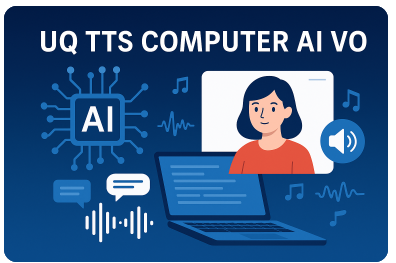Introduction to UQ TTS Computer AI Voice
In today’s digital age, artificial intelligence is reshaping how we communicate. One of the fascinating advancements is UQ TTS Computer AI Voice, a powerful text-to-speech technology that allows you to generate high-quality speech using artificial intelligence.
The “UQ” stands for Ultra Quality, emphasizing the superior clarity, tone, and realism of the voices it creates. Platforms like 101soundboards have made this technology popular by allowing users to generate voices of well-known celebrities, cartoon characters, and public figures simply by typing in text.
This AI-driven tool is not only used for fun but also serves practical purposes across entertainment, education, and accessibility. Whether you want to mimic a famous personality or create custom audio content, UQ TTS Computer AI Voice provides an easy, powerful solution.
Understanding Text-to-Speech (TTS) Technology
Text-to-speech (TTS) technology converts written words into spoken audio using digital voice synthesis. Traditionally, TTS engines produced robotic and unnatural sounds. However, with the rise of machine learning and neural networks, new models like UQ TTS have achieved much more lifelike speech patterns.
This advancement is due to deep learning, which allows AI systems to learn pitch, rhythm, accent, and emotion from hours of human speech data. As a result, UQ TTS Computer AI Voice provides audio output that can sound strikingly human-like, often making it difficult to tell the difference between real and synthetic voices.
Features of UQ TTS Computer AI Voice
The UQ TTS platform stands out for its unique features, which make it appealing to both casual users and professionals. Here’s an overview of its most notable functions:
Multilingual Support and Accents
UQ TTS can generate speech in various languages and regional accents. This feature is especially helpful for global users who want to create voiceovers in different tongues or simulate diverse accents for storytelling or language learning.
Realistic Voice Cloning
This technology can closely replicate real human voices, capturing fine vocal characteristics like pitch, pacing, and emotion. For instance, voices of famous individuals such as MrBeast, Jennifer Lawrence, and Mark Zuckerberg are available. These voices are modeled after real audio samples to maintain authenticity.
Audio Effects and Background Enhancements
Some versions of UQ TTS include features like echo, background sound, or even musical elements. This makes it suitable for creating rich soundscapes for podcasts, animations, or theatrical projects.
Popular Voices in UQ TTS Computer AI Voice
The diversity of voices available on UQ TTS makes it a top choice among creators. Users can select from hundreds of voices based on their needs. Below is a sample table listing some popular voices and their associated uses:
| Voice Name | Character Type | Popular Usage |
|---|---|---|
| MrBeast | YouTuber | Reaction videos, memes |
| Minnie Mouse | Cartoon Character | Kids’ content, entertainment |
| Mark Zuckerberg | Tech Personality | Satire, tech commentary |
| Aang (Avatar) | Anime/Cartoon Hero | Fan projects, dubbing |
| Professor Oak | Game Character | Pokémon narrations |
| Jennifer Lawrence | Hollywood Actress | Drama voiceovers, mimicry |
These voices can be used to bring creativity and humor to online content or to develop serious narrative projects.
How to Use UQ TTS on 101 Soundboards
Using UQ TTS Computer AI Voice on 101soundboards is simple, even for beginners. Here’s how the process works in a step-by-step explanation:
First, visit the 101 Soundboards TTS page. There, you’ll find a vast list of available voices. You can browse by category or use the search bar to locate a specific voice. Once you find the desired voice, click on it to open its TTS interface.
Next, type your desired sentence into the input text box. It could be a fun phrase, a question, or a full paragraph. After that, click on the “Generate” button, and the platform will process your input using the selected AI voice. Within seconds, the generated voice clip will be ready. You can either play it directly or download it for use in your own project.
Applications of UQ TTS Computer AI Voice
The applications of UQ TTS Computer AI Voice go far beyond simple entertainment. Here are several ways this technology is being used across various fields:
Entertainment
UQ TTS is a favorite among meme creators, YouTubers, and streamers who want to add personality or humor to their videos. It’s great for creating voiceovers, parodies, or funny commentary using the voices of known figures.
Content Creation
Whether you’re making TikToks, educational explainer videos, or podcasts, having access to diverse and dynamic voices makes content more engaging. UQ TTS helps by offering unique voices without the need to hire voice actors.
Education
Educators can use UQ TTS to create learning content for students, especially in language learning or storytelling. The realistic voices can maintain student interest and improve retention.
Accessibility
For individuals who are visually impaired or have reading challenges, TTS tools like UQ TTS provide an essential service—reading out text in clear, human-like speech.
Ethical Considerations and Responsible Use
Although UQ TTS Computer AI Voice is fun and functional, it’s important to use it responsibly. Voice cloning, especially of real individuals, can raise ethical concerns. Using these voices for misleading, abusive, or defamatory purposes is strictly discouraged.
Users must remember:
- The voices are intended for non-commercial and entertainment use.
- Do not create audio that misrepresents real people or makes them appear to say things they never did.
- Always respect copyright and personality rights when generating content.
Several platforms, including 101soundboards, display clear disclaimers to promote ethical use of AI voices.
Future of UQ TTS Computer AI Voice
As AI technology continues to evolve, the potential of UQ TTS Computer AI Voice will only expand. Future developments may include:
- Real-time voice synthesis, allowing live interactions with AI-generated voices.
- Emotional expression improvements, enabling voices to portray happiness, sadness, or anger more effectively.
- Greater language diversity, supporting even more dialects, regional accents, and tonal variations.
This means the use cases will grow to include customer service bots, interactive gaming, audio books, and more.
Conclusion
The rise of UQ TTS Computer AI Voice has revolutionized how we create and interact with voice content. From lifelike recreations of celebrity voices to multilingual support and creative applications, it offers endless possibilities. Whether you’re an educator, a content creator, or just someone who enjoys experimenting with AI tools, UQ TTS makes high-quality voice generation easy and fun.
Related Articles
Unveiling the Dietz Reflector Telescope Camera Lens: A Complete Guide
Realistic Outdoor Dummy Surveillance Camera by ThugStyleDefense: Smart Security Without the Cost
How to Keep Backup Camera On While Driving with Jensen CAR8000: A Complete Guide
Lexus RZ Technology Package $1,655 – What Does It Include? Full Guide & Features Explained

